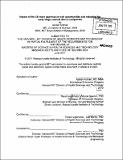Impact of the CE mark approval on exit opportunities and validation for early stage medical device companies
Author(s)
Kothari, Ashish (Ashish Shrikant)
DownloadFull printable version (8.540Mb)
Alternative title
Impact of the Conformité Européene mark approval on exit opportunities and validation for early stage medical device companies
Other Contributors
Harvard University--MIT Division of Health Sciences and Technology.
Advisor
Myron Spector and Carl Berke.
Terms of use
Metadata
Show full item recordAbstract
The aim of this thesis was to look at the impact of acquiring the CE marking approval on the outcome of early stage medical device companies, specifically its impact on strategic acquisition opportunities and on valuation. We gathered data on acquisitions of 237 companies over the past ten years, from April 01, 2002 to March 31, 2011. These data were gathered from various sources, and information on the date of acquisition, enterprise value, funds invested to date, date of incorporation, status and dates of CE and FDA approvals, patent status, type of regulatory clearances (PMA versus 510K), type of sales models (direct versus distributorship), capitalization status and last twelve month stock returns of the acquirer was acquired. These data were then analyzed using basic statistical methods and multivariate linear regression analyses to determine the significance of the CE marking on the outcomes of these companies. Our results support the claim that the CE mark does significantly improve outcomes for early stage medical device companies, in terms of time to strategic acquisition, which is by far the commonest exit route for these companies. On the other hand, we did not find any statistically significant impact of acquisition of the CE mark on the valuation or valuation multiples of these companies. These results have potential implications for management of these early stage medical device companies in making strategic decisions and for investors who are concerned about the exit opportunities and valuations, especially as it relates to funds invested. There could also be some policy implications in terms of the effort, duration and cost of getting a CE approval versus that of an FDA approval, which is especially important given the current growing concern about increasingly stringent regulation, rising costs and increasing delays in FDA approvals for medical devices.
Description
Thesis (S.M.)--Harvard-MIT Division of Health Sciences and Technology, 2011. Cataloged from PDF version of thesis. Includes bibliographical references (p. 85-87).
Date issued
2011Department
Harvard University--MIT Division of Health Sciences and TechnologyPublisher
Massachusetts Institute of Technology
Keywords
Harvard University--MIT Division of Health Sciences and Technology.